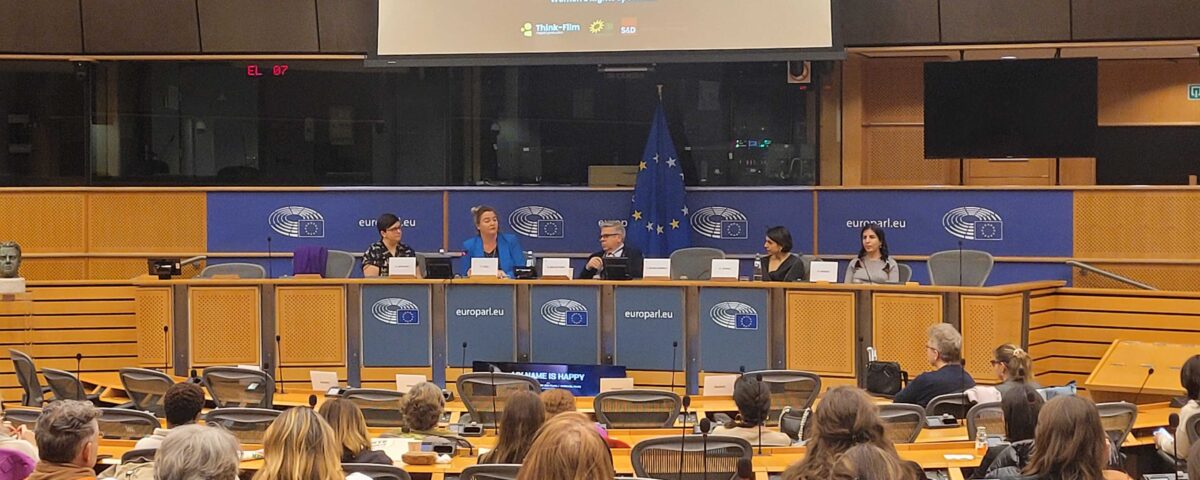The following captures points made by speakers in a discussion around the film “My Name Is Happy” in the European Parliament for International Women’s Day 2024.
A household name in Turkey, singer Mutlu Kaya was a finalist on “Turkey’s Got Talent” and heading for stardom. Her boyfriend, a man jealous of her success, brutally attacked her, to try and take it all away. But Mutlu was not so easily broken.
The documentary film “My Name Is Happy” from director Ayşe Toprak, which tells Mutlu’s story, is not a story of a victim; rather, it is that of a young woman who is taking her life in her own hands. In Ayşe’s words, “Mutlu’s strength lies in knowing and showing that she has done nothing wrong, that the violence committed against her was not her fault.”
Mutlu’s courage to challenge societal norms and fight for women’s rights embodies the spirit of change that is desperately needed in Turkey.
“My Name Is Happy” marks a pivotal moment in the ongoing dialogue between the EU and Turkey. It is a painful reality that Turkey is backsliding on human rights commitments, and that powerful women who have agency to speak are perceived by the extreme political right wing as a threat. An anti-feminist agenda led by the government is effectively sanctioning widespread femicide and gender-based violence by deliberately and specifically targeting women.
There is scope for optimism. MEP Gwendoline Delbos-Corfield (Greens/EFA) highlights that “the question-mark on the future of the EU-Turkey relationship is an entry point for change”. However, MEP Nacho Sanchez Amor (S&D) calls out the disconnect between Turkey’s ambitions to join the EU and its actions today, firmly emphasising that “Turkey will never be an EU member until it recognises that the rights of women are an indivisible part of the values of a modern society”.
Survivors of violence have the ability to change the narrative.
Mutlu’s story is not unique; women everywhere are victims of violence. The wrong is insidious: laws permit violence, a lack of data and taboos around victimhood keep women’s experiences invisible, and silence prevents societies from seeing that violence can be prevented and countered.
Author and Women’s Right Specialist Samaneh Shabani has bravely broken silence to focus her doctoral thesis on the issue of domestic violence in her own country of Iran. In so doing, she has also shed crucial light on the intersectionality of violence with other fundamental human rights, and the specific issues that women with disabilities face of low awareness, gaps in law enforcement and access to justice obstacles.
Samaneh’s work is a key example of how vital women are in keeping governments accountable. Reflecting on what is needed to combat violence against women holistically, she commented, “awareness is crucial; if we let everybody raise their own awareness about their rights as human beings, and how equal we are, then many stigmas will fall.”
Violence needs to become taboo.
Raising voices is key to rebalancing power. 2024 marks the 10-year anniversary of the Council of Europe Istanbul Convention on Preventing and Combating Violence Against Women and Domestic Violence. Yet, relatively few people in society at large really see the Istanbul Convention as important, which limits its effectiveness. Florence Raes, UN Women Brussels Director, would go even further. She said, “Legislation is important, but let’s be honest, it is also a question of implementing legislation, and of how much budget is allocated to combating violence against women.”
Ultimately, the path forward in ending femicide and gender-based violence requires a concerted effort from all sectors of society. Sanchez Amor, Delbos-Corfield, Shabani and Raes all see reasons for hope, and collectively identified strong laws, good education, brave politicians, allyship – especially from boys and men, elevating survivor voices and storytelling that inspires as key ‘puzzle pieces’ that are needed to achieve meaningful change.
This is a moment that demands attention, action, and above all, a commitment to fostering a future where women’s rights are not only protected but celebrated.
“My Name Is Happy” has its Turkish premiere at the Istanbul Film Festival in April 2024. It will also be broadcast on ARTE and BR in April, and is available in the UK on 4OD.


